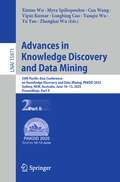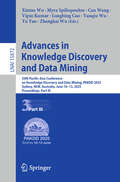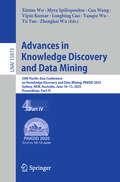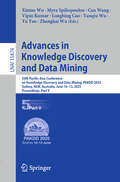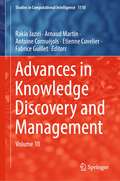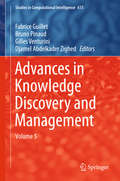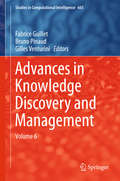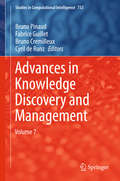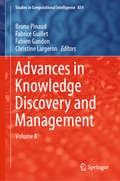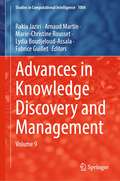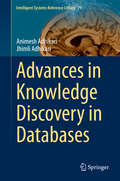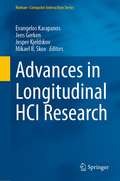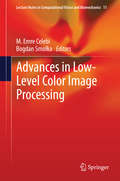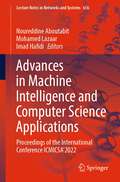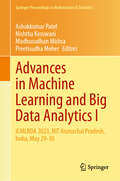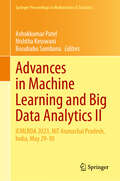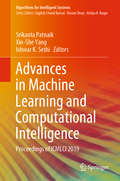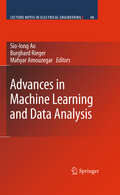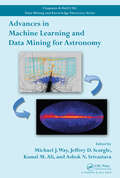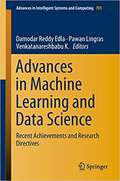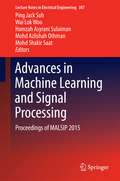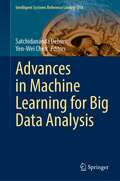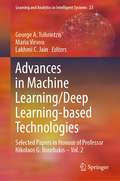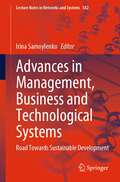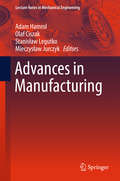- Table View
- List View
Advances in Knowledge Discovery and Data Mining: 29th Pacific-Asia Conference on Knowledge Discovery and Data Mining, PAKDD 2025, Sydney, NSW, Australia, June 10–13, 2025, Proceedings, Part II (Lecture Notes in Computer Science #15871)
by Longbing Cao Myra Spiliopoulou Vipin Kumar Can Wang Yu Yao Xintao Wu Yanqiu Wu Zhangkai WuThe five-volume set, LNAI 158710 - 15874 constitutes the proceedings of the 29th Pacific-Asia Conference on Knowledge Discovery and Data Mining, PAKDD 2025, held in Sydney, New South Wales, Australia, during June 10–13, 2025. The conference received a total of 557 submissions to the main track, 35 submissions to the survey track and 104 submittion to the special track on LLMs. Of these, 134 papers have been accepted for the main track, 10 for the survey track and 24 for the LLM track. 68 papers have been transferred to the4 DSFA special session. The papers have been organized in topical sections as follows: Part I: Anomaly Detection; Business Data Analysis; Clustering; Continual Learning; Contrastive Learning; Data Processing for Learning; Part II: Fairness and Interpretability; Federated Learning; Graph Mining and GNN; Learning on Scientific Data; Part III: Machine Learning; Multi-modality; OOD and Optimization; Recommender Systems; Representation Learning and Generative AI; Part IV: Security and Privacy; Temporal Learning; Survey; Part V: LLM Fine-tuning and Prompt Engineering; Fairness and Interpretability of LLMs; LLM Application; OOD and Optimization of LLMs.
Advances in Knowledge Discovery and Data Mining: 29th Pacific-Asia Conference on Knowledge Discovery and Data Mining, PAKDD 2025, Sydney, NSW, Australia, June 10–13, 2025, Proceedings, Part III (Lecture Notes in Computer Science #15872)
by Longbing Cao Myra Spiliopoulou Vipin Kumar Can Wang Yu Yao Xintao Wu Yanqiu Wu Zhangkai WuThe five-volume set, LNAI 158710 - 15874 constitutes the proceedings of the 29th Pacific-Asia Conference on Knowledge Discovery and Data Mining, PAKDD 2025, held in Sydney, New South Wales, Australia, during June 10–13, 2025. The conference received a total of 557 submissions to the main track, 35 submissions to the survey track and 104 submittion to the special track on LLMs. Of these, 134 papers have been accepted for the main track, 10 for the survey track and 24 for the LLM track. 68 papers have been transferred to the4 DSFA special session. The papers have been organized in topical sections as follows: Part I: Anomaly Detection; Business Data Analysis; Clustering; Continual Learning; Contrastive Learning; Data Processing for Learning; Part II: Fairness and Interpretability; Federated Learning; Graph Mining and GNN; Learning on Scientific Data; Part III: Machine Learning; Multi-modality; OOD and Optimization; Recommender Systems; Representation Learning and Generative AI; Part IV: Security and Privacy; Temporal Learning; Survey; Part V: LLM Fine-tuning and Prompt Engineering; Fairness and Interpretability of LLMs; LLM Application; OOD and Optimization of LLMs.
Advances in Knowledge Discovery and Data Mining: 29th Pacific-Asia Conference on Knowledge Discovery and Data Mining, PAKDD 2025, Sydney, NSW, Australia, June 10–13, 2025, Proceedings, Part IV (Lecture Notes in Computer Science #15873)
by Longbing Cao Myra Spiliopoulou Vipin Kumar Can Wang Yu Yao Xintao Wu Yanqiu Wu Zhangkai WuThe five-volume set, LNAI 158710 - 15874 constitutes the proceedings of the 29th Pacific-Asia Conference on Knowledge Discovery and Data Mining, PAKDD 2025, held in Sydney, New South Wales, Australia, during June 10–13, 2025. The conference received a total of 557 submissions to the main track, 35 submissions to the survey track and 104 submittion to the special track on LLMs. Of these, 134 papers have been accepted for the main track, 10 for the survey track and 24 for the LLM track. 68 papers have been transferred to the4 DSFA special session. The papers have been organized in topical sections as follows: Part I: Anomaly Detection; Business Data Analysis; Clustering; Continual Learning; Contrastive Learning; Data Processing for Learning; Part II: Fairness and Interpretability; Federated Learning; Graph Mining and GNN; Learning on Scientific Data; Part III: Machine Learning; Multi-modality; OOD and Optimization; Recommender Systems; Representation Learning and Generative AI; Part IV: Security and Privacy; Temporal Learning; Survey; Part V: LLM Fine-tuning and Prompt Engineering; Fairness and Interpretability of LLMs; LLM Application; OOD and Optimization of LLMs.
Advances in Knowledge Discovery and Data Mining: 29th Pacific-Asia Conference on Knowledge Discovery and Data Mining, PAKDD 2025, Sydney, NSW, Australia, June 10–13, 2025, Proceedings, Part V (Lecture Notes in Computer Science #15874)
by Longbing Cao Myra Spiliopoulou Vipin Kumar Can Wang Yu Yao Xintao Wu Yanqiu Wu Zhangkai WuThe five-volume set, LNAI 158710 - 15874 constitutes the proceedings of the 29th Pacific-Asia Conference on Knowledge Discovery and Data Mining, PAKDD 2025, held in Sydney, New South Wales, Australia, during June 10–13, 2025. The conference received a total of 557 submissions to the main track, 35 submissions to the survey track and 104 submittion to the special track on LLMs. Of these, 134 papers have been accepted for the main track, 10 for the survey track and 24 for the LLM track. 68 papers have been transferred to the4 DSFA special session. The papers have been organized in topical sections as follows: Part I: Anomaly Detection; Business Data Analysis; Clustering; Continual Learning; Contrastive Learning; Data Processing for Learning; Part II: Fairness and Interpretability; Federated Learning; Graph Mining and GNN; Learning on Scientific Data; Part III: Machine Learning; Multi-modality; OOD and Optimization; Recommender Systems; Representation Learning and Generative AI; Part IV: Security and Privacy; Temporal Learning; Survey; Part V: LLM Fine-tuning and Prompt Engineering; Fairness and Interpretability of LLMs; LLM Application; OOD and Optimization of LLMs.
Advances in Knowledge Discovery and Management: Volume 10 (Studies in Computational Intelligence #1110)
by Fabrice Guillet Arnaud Martin Rakia Jaziri Antoine Cornuéjols Etienne CuvelierThis book comprises a distinguished collection of cutting-edge scientific contributions. Encompassing a wide range of subjects, it delves into machine learning, data mining, text analysis, data visualization, knowledge management, and more. The included articles are expanded versions of carefully selected top papers that were originally presented at the EGC’2020 conferences held in Paris (France, January 27-31, 2020). It is intended for researchers interested in these fields, including PhD and MSc students, and researchers from public or private laboratories. These extended versions underwent an additional peer-review process, building upon the already accepted long-format papers from the conference. The selection of long and short papers for the conference itself followed a rigorous double-blind peer-review process, evaluating numerous submissions (with a long paper acceptance rate of approximately 25%). For more details about the EGC society, please consult egc.asso.fr."
Advances in Knowledge Discovery and Management: Volume 5 (Studies in Computational Intelligence #615)
by Fabrice Guillet Bruno Pinaud Gilles Venturini Djamel Abdelkader ZighedThis book is a collection of representative and novel works done in Data Mining, Knowledge Discovery, Clustering and Classification that were originally presented in French at the EGC'2013 (Toulouse, France, January 2013) and EGC'2014 Conferences (Rennes, France, January 2014). These conferences were respectively the 13th and 14th editions of this event, which takes place each year and which is now successful and well-known in the French-speaking community. This community was structured in 2003 by the foundation of the French-speaking EGC society (EGC in French stands for "Extraction et Gestion des Connaissances" and means "Knowledge Discovery and Management", or KDM). This book is aiming at all researchers interested in these fields, including PhD or MSc students, and researchers from public or private laboratories. It concerns both theoretical and practical aspects of KDM. The book is structured in two parts called "Applications of KDM to real datasets" and "Foundations of KDM".
Advances in Knowledge Discovery and Management: Volume 6 (Studies in Computational Intelligence #665)
by Fabrice Guillet Bruno Pinaud Gilles VenturiniThis book is a collection of representative and novel works done in Data Mining, Knowledge Discovery, Clustering and Classification that were originally presented in French at the EGC'2012 Conference held in Bordeaux, France, on January 2012. This conference was the 12th edition of this event, which takes place each year and which is now successful and well-known in the French-speaking community. This community was structured in 2003 by the foundation of the French-speaking EGC society (EGC in French stands for Extraction et Gestion des Connaissances'' and means Knowledge Discovery and Management'', or KDM). This book is intended to be read by all researchers interested in these fields, including PhD or MSc students, and researchers from public or private laboratories. It concerns both theoretical and practical aspects of KDM. The book is structured in two parts called Knowledge Discovery and Data Mining'' and Classification and Feature Extraction or Selection''. The first part (6 chapters) deals with data clustering and data mining. The three remaining chapters of the second part are related to classification and feature extraction or feature selection.
Advances in Knowledge Discovery and Management: Volume 7 (Studies in Computational Intelligence #732)
by Fabrice Guillet Bruno Pinaud Bruno Cremilleux Cyril RunzThis book is a collection of representative and novel works done in Data Mining, Knowledge Discovery, Clustering and Classification that were originally presented in French at the EGC'2012 Conference held in Bordeaux, France, on January 2012. This conference was the 12th edition of this event, which takes place each year and which is now successful and well-known in the French-speaking community. This community was structured in 2003 by the foundation of the French-speaking EGC society (EGC in French stands for ``Extraction et Gestion des Connaissances'' and means ``Knowledge Discovery and Management'', or KDM). This book is intended to be read by all researchers interested in these fields, including PhD or MSc students, and researchers from public or private laboratories. It concerns both theoretical and practical aspects of KDM. The book is structured in two parts called ``Knowledge Discovery and Data Mining'' and ``Classification and Feature Extraction or Selection''. The first part (6 chapters) deals with data clustering and data mining. The three remaining chapters of the second part are related to classification and feature extraction or feature selection.
Advances in Knowledge Discovery and Management: Volume 8 (Studies in Computational Intelligence #834)
by Fabien Gandon Fabrice Guillet Bruno Pinaud Christine LargeronThis book highlights novel research in Knowledge Discovery and Management (KDM), gathering the extended, peer-reviewed versions of outstanding papers presented at the annual conferences EGC’2017 & EGC’2018. The EGC conference cycle was founded by the International French-speaking EGC society (“Extraction et Gestion des Connaissances”) in 2003, and has since become a respected fixture among the French-speaking community. In addition to the annual conference, the society organizes various other events in order to promote exchanges between researchers and companies concerned with KDM and its applications to business, administration, industry and public organizations. Addressing novel research in data science, semantic Web, clustering, and classification, the content presented here will chiefly benefit researchers interested in these fields, including Ph.D./M.Sc. students, at public and private laboratories alike.
Advances in Knowledge Discovery and Management: Volume 9 (Studies in Computational Intelligence #1004)
by Fabrice Guillet Arnaud Martin Rakia Jaziri Marie-Christine Rousset Lydia Boudjeloud-AssalaThis book is a collection of high scientific novel contributions addressing several of these challenges. These articles are extended versions of a selection of the best papers that were initially presented at the French-speaking conferences EGC’2019held in Metz (France, January 21-25, 2019).These extended versions have been accepted after an additional peer-review process among papers already accepted in long format at the conference. Concerning the conference, the long and short papers selection were also the result of a double blind peer review process among the hundreds of papers initially submitted to each edition of the conference (acceptance rate for long papers is about 25%.
Advances in Knowledge Discovery in Databases (Intelligent Systems Reference Library #79)
by Animesh Adhikari Jhimli AdhikariThis book presents recent advances in Knowledge discovery in databases (KDD) with a focus on the areas of market basket database, time-stamped databases and multiple related databases. Various interesting and intelligent algorithms are reported on data mining tasks. A large number of association measures are presented, which play significant roles in decision support applications. This book presents, discusses and contrasts new developments in mining time-stamped data, time-based data analyses, the identification of temporal patterns, the mining of multiple related databases, as well as local patterns analysis.
Advances in Longitudinal HCI Research (Human–Computer Interaction Series)
by Evangelos Karapanos Jens Gerken Jesper Kjeldskov Mikael B. SkovLongitudinal studies have traditionally been seen as too cumbersome and labor-intensive to be of much use in research on Human-Computer Interaction (HCI). However, recent trends in market, legislation, and the research questions we address, have highlighted the importance of studying prolonged use, while technology itself has made longitudinal research more accessible to researchers across different application domains. Aimed as an educational resource for graduate students and researchers in HCI, this book brings together a collection of chapters, addressing theoretical and methodological considerations, and presenting case studies of longitudinal HCI research. Among others, the authors:discuss the theoretical underpinnings of longitudinal HCI research, such as when a longitudinal study is appropriate, what research questions can be addressed and what challenges are entailed in different longitudinal research designsreflect on methodological challenges in longitudinal data collection and analysis, such as how to maintain participant adherence and data reliability when employing the Experience Sampling Method in longitudinal settings, or how to cope with data collection fatigue and data safety in applications of autoethnography and autobiographical design, which may span from months to several yearspresent a number of case studies covering different topics of longitudinal HCI research, from “slow technology”, to self-tracking, to mid-air haptic feedback, and crowdsourcing.
Advances in Low-Level Color Image Processing (Lecture Notes in Computational Vision and Biomechanics #11)
by M. Emre Celebi Bogdan SmolkaColor perception plays an important role in object recognition and scene understanding both for humans and intelligent vision systems. Recent advances in digital color imaging and computer hardware technology have led to an explosion in the use of color images in a variety of applications including medical imaging, content-based image retrieval, biometrics, watermarking, digital inpainting, remote sensing, visual quality inspection, among many others. As a result, automated processing and analysis of color images has become an active area of research, to which the large number of publications of the past two decades bears witness. The multivariate nature of color image data presents new challenges for researchers and practitioners as the numerous methods developed for single channel images are often not directly applicable to multichannel ones. The goal of this volume is to summarize the state-of-the-art in the early stages of the color image processing pipeline.
Advances in Machine Intelligence and Computer Science Applications: Proceedings of the International Conference ICMICSA’2022 (Lecture Notes in Networks and Systems #656)
by Mohamed Lazaar Noureddine Aboutabit Imad HafidiThis book encloses latest and advanced researches on artificial intelligence and its applications in computer science. It is an interesting book that aims to help students, researchers, industrialists, and policymakers understand, promote, and synthesize innovative solutions and think of new ideas with the application of artificial intelligence concepts. It also allows to know the existing scientific works and contributions in the literature. This book identifies original research in new directions and advances focused on multidisciplinary areas and closely related to the use of artificial intelligence in applications of computer science, communication, and technology. The present book contains selected and extended high-quality papers of the 1st international conference on Machine Intelligence and Computer Science Applications (ICMICSA’2022). It is the result of a reviewed, evaluated, and presented work in ICMICSA’2022 held on November 28–29, 2022, in Khouribga, Morocco.
Advances in Machine Learning and Big Data Analytics I: ICMLBDA 2023, NIT Arunachal Pradesh, India, May 29-30 (Springer Proceedings in Mathematics & Statistics #441)
by Preetisudha Meher Nishtha Kesswani Madhusudhan Mishra Ashokkumar PatelThis edited volume on machine learning and big data analytics (Proceedings of ICMLBDA 2023, that was held on May 29-30, 2023 by NERIST and NIT Arunachal Pradesh India) is intended to be used as a reference book for researchers and professionals to share their research and reports of new technologies and applications in Machine Learning and Big Data Analytics like biometric Recognition Systems, medical diagnosis, industries, telecommunications, AI Petri Nets Model-Based Diagnosis, gaming, stock trading, Intelligent Aerospace Systems, robot control, law, remote sensing and scientific discovery agents and multiagent systems; and natural language and Web intelligence. The intent of this book is to provide awareness of algorithms used for machine learning and big data in the advanced Scientific Technologies, provide a correlation of multidisciplinary areas and become a point of great interest for Data Scientists, systems architects, developers, new researchers and graduate level students. This volume provides cutting-edge research from around the globe on this field. Current status, trends, future directions, opportunities, etc. are discussed, making it friendly for beginners and young researchers.
Advances in Machine Learning and Big Data Analytics II: ICMLBDA 2023, NIT Arunachal Pradesh, India, May 29-30 (Springer Proceedings in Mathematics & Statistics #442)
by Nishtha Kesswani Ashokkumar Patel Bosubabu SambanaIn the dynamic landscape of technology, machine learning and big data analytics have emerged as transformative forces, reshaping industries and empowering innovation. Machine learning, a subset of artificial intelligence, equips systems to learn and adapt from data, revolutionizing decision-making, automation, and predictive capabilities. Meanwhile, Big Data Analytics processes and extracts insights from vast and complex datasets, unveiling hidden patterns and trends. Together, these fields enable us to harness the immense power of data for smarter business strategies, improved healthcare, enhanced user experiences, and countless other applications. This edited volume on machine learning and big data analytics (Proceedings of ICMLBDA 2023, which was held on May 29-30, 2023 by NERIST and NIT Arunachal Pradesh India) introduces an exciting journey into the intersection of machine learning and Big Data Analytics, where data becomes a catalyst for progress and transformation.
Advances in Machine Learning and Computational Intelligence: Proceedings of ICMLCI 2019 (Algorithms for Intelligent Systems)
by Xin-She Yang Ishwar K. Sethi Srikanta PatnaikThis book gathers selected high-quality papers presented at the International Conference on Machine Learning and Computational Intelligence (ICMLCI-2019), jointly organized by Kunming University of Science and Technology and the Interscience Research Network, Bhubaneswar, India, from April 6 to 7, 2019. Addressing virtually all aspects of intelligent systems, soft computing and machine learning, the topics covered include: prediction; data mining; information retrieval; game playing; robotics; learning methods; pattern visualization; automated knowledge acquisition; fuzzy, stochastic and probabilistic computing; neural computing; big data; social networks and applications of soft computing in various areas.
Advances in Machine Learning and Data Analysis (Lecture Notes in Electrical Engineering #48)
by Sio-Iong Ao Burghard B. Rieger Mahyar AmouzegarA large international conference on Advances in Machine Learning and Data Analysis was held in UC Berkeley, California, USA, October 22-24, 2008, under the auspices of the World Congress on Engineering and Computer Science (WCECS 2008). This volume contains sixteen revised and extended research articles written by prominent researchers participating in the conference. Topics covered include Expert system, Intelligent decision making, Knowledge-based systems, Knowledge extraction, Data analysis tools, Computational biology, Optimization algorithms, Experiment designs, Complex system identification, Computational modeling, and industrial applications. Advances in Machine Learning and Data Analysis offers the state of the art of tremendous advances in machine learning and data analysis and also serves as an excellent reference text for researchers and graduate students, working on machine learning and data analysis.
Advances in Machine Learning and Data Mining for Astronomy (Chapman & Hall/CRC Data Mining and Knowledge Discovery Series)
by Ashok N. Srivastava Michael J. Way Jeffrey D. Scargle Kamal M. AliAdvances in Machine Learning and Data Mining for Astronomy documents numerous successful collaborations among computer scientists, statisticians, and astronomers who illustrate the application of state-of-the-art machine learning and data mining techniques in astronomy. Due to the massive amount and complexity of data in most scientific disciplines
Advances in Machine Learning and Data Science: Recent Achievements And Research Directives (Advances In Intelligent Systems And Computing #705)
by Pawan Lingras Damodar Reddy Venkatanareshbabu KuppiliPresents studies involving innovative combination of machine learning and data science.<P><P> Presents latest ideas and techniques in the field of data mining.<P> Serves as a good reference material for future work.<P> The Volume of “Advances in Machine Learning and Data Science - Recent Achievements and Research Directives” constitutes the proceedings of First International Conference on Latest Advances in Machine Learning and Data Science (LAMDA 2017). The 37 regular papers presented in this volume were carefully reviewed and selected from 123 submissions.<P> These days we find many computer programs that exhibit various useful learning methods and commercial applications. Goal of machine learning is to develop computer programs that can learn from experience. Machine learning involves knowledge from various disciplines like, statistics, information theory, artificial intelligence, computational complexity, cognitive science and biology. For problems like handwriting recognition, algorithms that are based on machine learning out perform all other approaches. Both machine learning and data science are interrelated. Data science is an umbrella term to be used for techniques that clean data and extract useful information from data. In field of data science, machine learning algorithms are used frequently to identify valuable knowledge from commercial databases containing records of different industries, financial transactions, medical records, etc.<P> The main objective of this book is to provide an overview on latest advancements in the field of machine learning and data science, with solutions to problems in field of image, video, data and graph processing, pattern recognition, data structuring, data clustering, pattern mining, association rule based approaches, feature extraction techniques, neural networks, bio inspired learning and various machine learning algorithms.
Advances in Machine Learning and Signal Processing: Proceedings of MALSIP 2015 (Lecture Notes in Electrical Engineering #387)
by Ping Jack Soh Wai Lok Woo Hamzah Asyrani Sulaiman Mohd Azlishah Othman Mohd Shakir SaatThisbook presents important research findings and recent innovations in the fieldof machine learning and signal processing. A wide range of topics relating to machinelearning and signal processing techniques and their applications are addressed inorder to provide both researchers and practitioners with a valuable resourcedocumenting the latest advances and trends. The book comprises a carefulselection of the papers submitted to the 2015 International Conference on MachineLearning and Signal Processing (MALSIP 2015), which was held on 15-17 December2015 in Ho Chi Minh City, Vietnam with the aim of offering researchers,academicians, and practitioners an ideal opportunity to disseminate theirfindings and achievements. All of the included contributions were chosen byexpert peer reviewers from across the world on the basis of their interest tothe community. In addition to presenting the latest in design, development, andresearch, the book provides access to numerous new algorithms for machinelearning and signal processing for engineering problems.
Advances in Machine Learning for Big Data Analysis (Intelligent Systems Reference Library #218)
by Satchidananda Dehuri Yen-Wei ChenThis book focuses on research aspects of ensemble approaches of machine learning techniques that can be applied to address the big data problems. In this book, various advancements of machine learning algorithms to extract data-driven decisions from big data in diverse domains such as the banking sector, healthcare, social media, and video surveillance are presented in several chapters. Each of them has separate functionalities, which can be leveraged to solve a specific set of big data applications. This book is a potential resource for various advances in the field of machine learning and data science to solve big data problems with many objectives. It has been observed from the literature that several works have been focused on the advancement of machine learning in various fields like biomedical, stock prediction, sentiment analysis, etc. However, limited discussions have been carried out on application of advanced machine learning techniques in solving big data problems.
Advances in Machine Learning/Deep Learning-based Technologies: Selected Papers in Honour of Professor Nikolaos G. Bourbakis – Vol. 2 (Learning and Analytics in Intelligent Systems #23)
by Lakhmi C. Jain Maria Virvou George A. TsihrintzisAs the 4th Industrial Revolution is restructuring human societal organization into, so-called, “Society 5.0”, the field of Machine Learning (and its sub-field of Deep Learning) and related technologies is growing continuously and rapidly, developing in both itself and towards applications in many other disciplines. Researchers worldwide aim at incorporating cognitive abilities into machines, such as learning and problem solving. When machines and software systems have been enhanced with Machine Learning/Deep Learning components, they become better and more efficient at performing specific tasks. Consequently, Machine Learning/Deep Learning stands out as a research discipline due to its worldwide pace of growth in both theoretical advances and areas of application, while achieving very high rates of success and promising major impact in science, technology and society. The book at hand aims at exposing its readers to some of the most significant Advances in Machine Learning/Deep Learning-based Technologies. The book consists of an editorial note and an additional ten (10) chapters, all invited from authors who work on the corresponding chapter theme and are recognized for their significant research contributions. In more detail, the chapters in the book are organized into five parts, namely (i) Machine Learning/Deep Learning in Socializing and Entertainment, (ii) Machine Learning/Deep Learning in Education, (iii) Machine Learning/Deep Learning in Security, (iv) Machine Learning/Deep Learning in Time Series Forecasting, and (v) Machine Learning in Video Coding and Information Extraction. This research book is directed towards professors, researchers, scientists, engineers and students in Machine Learning/Deep Learning-related disciplines. It is also directed towards readers who come from other disciplines and are interested in becoming versed in some of the most recent Machine Learning/Deep Learning-based technologies. An extensive list of bibliographic references at the end of each chapter guides the readers to probe further into the application areas of interest to them.
Advances in Management, Business and Technological Systems: Road Towards Sustainable Development (Lecture Notes in Networks and Systems #582)
by Irina SamoylenkoEconomic development, social sustainability, and environmental protection play a major role in terms of efforts for innovation, digitalization, business, and global development. Today, nations all over the world attempt to accomplish the United Nations Sustainable Development Goals and to ensure sustainable patterns. Combining empirical and theoretical information, this book demonstrates advanced initiatives and concrete examples from universities, research institutes, and companies, regarding cross-cutting issues in sustainable development of a wide range of fields. The major focus in the book is the promotion of quality of life, by means of a more sustainable food production, and improved food security. Additionally, the importance of digital technologies, business policy, social aspects, and corporate governance in ensuring sustainable regional development is studied. This book is a truly interdisciplinary publication, useful to scholars, social movements, practitioners, and members of governmental agencies and private companies.
Advances in Manufacturing (Lecture Notes in Mechanical Engineering)
by Adam Hamrol Olaf Ciszak Stanisław Legutko Mieczysław JurczykThis book covers a variety of topics in material, mechanical, and management engineering, especially in the area of machine design, product assembly, measurement systems, process planning and quality control. It describes cutting-edge methods and applications, together with exemplary case studies. The content is based on papers presented at the 5th International Scientific-Technical Conference (MANUFACTURING 2017) held in Poznan, Poland on 24-26 October 2017. The book brings together engineering and economic topics, is intended as an extensive, timely and practice-oriented reference guide for researchers and practitioners, and is expected to foster better communication and closer cooperation between universities and their business and industry partners.
